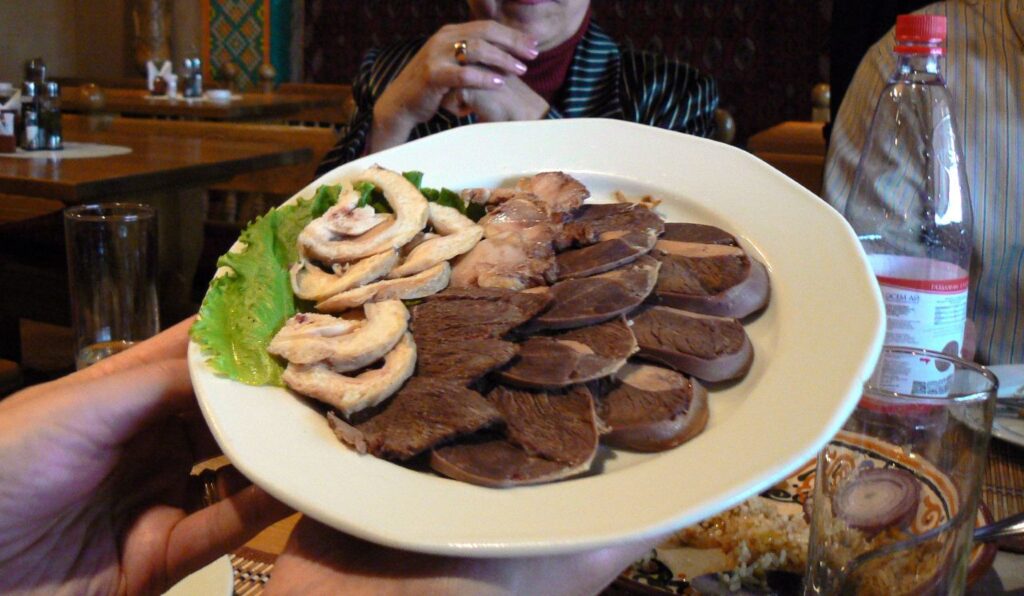Kazakh Hospitality

Credit: Sara Yeomans via Wikimedia Commons
Licence: Creative Commons
February 13, 2008
| Giver: | - |
|---|---|
| Receiver: | - |
| Gift: | - |
| Approach: | Other |
| Issues: | 11. Sustainable Cities and Communities, 3. Good Health and Well-Being |
Hospitality lies at the heart of Kazakh cultural identity. To uphold this rich heritage, the Kazakh people bestow an exalted status on all guests, regardless of their origins. This principle is embodied in the Kazakh phrase kudaiy konak, or “guest sent by God,” which is often used to describe strangers who arrive unexpectedly at one’s home. To demonstrate their generosity, Kazakh hosts go to great lengths to ensure that guests receive the finest food and most comfortable accommodations they can offer. Rooted in principles of mutual respect and reciprocity, these customs remain a vital aspect of everyday life in modern Kazakhstan.
The Veneration of the Guest
Hospitality in Kazakhstan reflects values and practices shaped by the nomadic history of the Kazakh people. Inhabitants of the Eurasian Steppe – a vast grassland plain extending from Eastern Europe to Northeast China – the Kazakhs came into frequent contact with diverse populations and cultures. Encountering a traveler without shelter for the night, a Kazakh family would always provide the person with food and a place to sleep. As a nomadic society, the Kazakhs understood that they might one day be in the same situation, and that their very survival could depend on such generosity from someone else. The uncertainty and vulnerability that characterized this itinerant way of life bred a mutual understanding between diverse tribes and clans, who adhered to similar standards when welcoming strangers into their homes.
Through these practices, the Kazakh people developed a profound esteem – bordering on reverence – for the figure of the guest. This attentiveness is reflected in the variety of unique terms the Kazakh language uses to distinguish different types of guests. In addition to the kudaiy konak, Kazakh households extend generosity to the arnaiy konak (“invited guest”); the kydyrma konak (“sudden guest”); the kutty konak (or “blessed guest,” so named because of the spirit of abundance and joy they bring to the home); and the kyltyima konak (the guest who invariably arrives without being invited). Kazakh culture also has a specific set of rituals to welcome erulikti konak, or “new settlers,” into the community.
The Rituals of the Table
Kazakhs serve food to their guests in accordance with time-honored rituals. The guest is seated at the place of honor, or tor; historically, this seat referred to the place opposite the entrance of a yurt. Hosts lay out a variety of dishes on a dastarkhan, a word derived from the Persian term for “tablecloth,” which roughly means “feast table.” The centerpiece of the meal typically consists of beshbarmak, a platter of boiled meat – traditionally horse meat, though sometimes lamb or beef – accompanied by pastry noodles. Even in modern Kazakhstan, hosts take pains to ensure that every aspect of the feast is homemade. As an expression of gratitude, the eldest guest offers a blessing at the end of the meal. If a guest has a particular musical talent, they are typically expected to perform after people have finished eating.
Steeped in geography and history, Kazakh hospitality is deeply intertwined with a sense of national identity that has endured for centuries. While the realities of everyday life have evolved over time, this tradition of generosity has maintained much of its original character and symbolic significance. As a gesture of welcome that extends to all people – whether family, friend or stranger – Kazakh hospitality embodies a spirit of giving that is equitable, compassionate and universal.
Contributor: Stephen Meyer
| Source type | Full citation | Link (DOI or URL) |
|---|---|---|
| Publication |
Chakyroglu, Altynshash Kurmanali, and Botagoz Suiyerkul. “Representation of the Concept ‘Hospitality’ in the Kazakh Language.” Procedia—Social and Behavioral Sciences 136 (July 2014): 124-28. |
http://dx.doi.org/10.1016/j.sbspro.2014.05.301 |
| Book |
Michaels, Paula A. “An Ethnohistorical Journey Through Kazakh Hospitality.” In Everyday Life in Central Asia: Past and Present, edited by Jeff Sahadeo and Russell Zanca, 145-59. Bloomington: Indiana University Press, 2007. |
https://archive.org/details/everydaylifeince0000unse/mode/2up |
| Publication |
Shashayeva, Gulbakyt, and Zhakhan Z. Moldabekov. “Hospitality in Kazakhstan: The Empire Sings Back.” Culture 12, no. 2 (2015): 163-80. |
https://doi.org/10.5840/cultura201512228 |
| Publication |
Shayakhmetova, Zhanna. “Family Hospitality Tradition Keeps Kazakhstan Strong.” Astana Times, November 1, 2016. |
https://astanatimes.com/2016/11/family-hospitality-tradition-keeps-kazakhstan-strong/ |